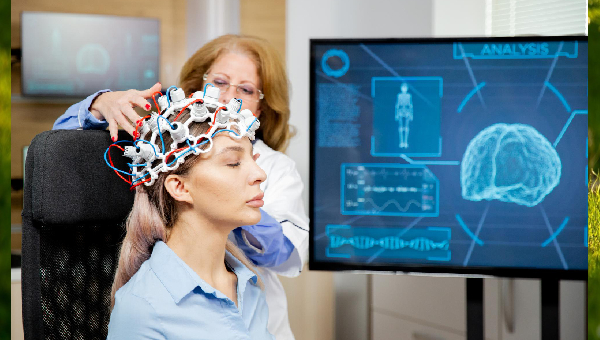Neurotech: Hacking the Brain for Health and Enhancement

In the past years, neurotechnology, or neurotech, has progressed steadily when it comes to discovering the fundamentals of functioning and exploring how to impact the brain's complex networks. As neuroscience penetrates cutting-edge technology, the goal is to devise innovative solutions capable of maintaining health and possibly enhancing human capabilities. It is possible to take advantage of – dealing with neurological diseases, to boosting cognitive ones – the enormous potential of neurotech. This article will relate the notable advancements in neurotech, their application, and the ethical aspect of the subject.
Understanding Neurotechnology
Neurotechnology is a diverse umbrella term that spans the monitoring, modulation, and enhancement of brain activity by an array of tools and methods. These disruptive technologies, when employed together, interface with the nervous system roughly at the level of the neurons, which opens up unparalleled neurological possibilities. The world of neurotech is an interesting one as it includes all fields from neuroscience, computer science, engineering, and psychology. Therefore, a multidisciplinary approach that targets the healthy brain and enhances it is pursued diligently.
Key Developments in Neurotech
Following are the key developments in Neurotech:
Brain-Computer Interfaces (BCIs)
Brain-computer interfaces (BCIs) or sensor-connected devices are undoubtedly the most notable neurotechnology. BCIs delineate a direct communication pathway wherein the brain and external devices can exchange messages, hence allowing people to operate computers, artificial limbs, and other forms of technology with their minds. In the beginning, it was conceived to address people who had been disabled mostly physically and now are being used for other purposes like games, cognitive boosting you name it.
Neurostimulation
Neurostimulation attempts to alter brain activity using electrical or magnetic sanctions. Studies have been done to see the effect of applications like TMS and DBS on patients diagnosed with depression, Parkinson’s disease, and epilepsy and such proved to be helpful in the treatment of all these conditions. By modifying neural transmission, neurostimulation gives the chance to patients with neurological disorders to relief from their symptoms and improve their lives in many aspects.
Neurofeedback
Neurofeedback technology is a form of biofeedback that helps people have more control over their brain wave activity. The system may help users control certain functions of their brains in real time and within seconds. This may help people to focus better and handle anxiety. The neurofeedback approach which is quite useful in containing ADHD, anxiety, and insomnia symptoms is also being tested for improving creativity and focus.
Neural Implants
The miracle of neural implants which are advancing the neurotech frontier is especially promising in the aspects of inter-brain connectivity. However, these devices are placed in the brain to compensate for loss or even to improve the functioning of the brain. To put this more specifically, cochlear implants have enabled thousands of people who are hard of hearing to regain the ability to talk. The new generation of neuroprosthetics not only improves the existing conditions of sensory and motor impairments but offers a beacon of hope for the people whose lives have been affected by spinal cord injuries, visual disabilities, as well as other latent illnesses via the 50.
Applications of Neurotech
Following is the list of applications of neurotech:
Treating Neurological Disorders
It is particularly worth mentioning that neurotech has revolutionized the field of treatment of neurological disorders. Disabling outcomes like seizure conditions, Parkinson’s disease, and chronic pain can leave one disabled. Traditional therapies might be ineffective. The neurotech not only generates new intervention modes, but it has also proved more precise and effective healing methods. One of the examples is a DBS (Deep Brain Stimulation) which relieves tremors and elevates motor functions in the case of Parkinson’s, and TMS (trans-cranial magnetic stimulation) which has been successfully used for mitigating depressive symptoms.
Enhancing Cognitive Abilities
Displaying abilities that go beyond treatment, neuro tech is explored for the possible cognitive boost performance as well. We can use BCIs and neurofeedback-like apparatuses to enhance perceptibility, memory, and meta-cognitive skills. As can be seen from the example, the gamers train their cognitive abilities by using BCI such as achieving better concentration, orientation of mind, and faster reaction. In school, it can be employed to personalize learning around how each individual’s mind operates thus making the learning process efficient.
Mental Health
Neurotech has also got into one of the areas where it leads to improvement – mental health issues. The work of neurofeedback and neurostimulation techniques in the treatment of different diseases such as depression, anxiety, and PTSD is considered to be a success. This group of technologies can offer people non-invasive therapies that can be compared to medication and both of them have decreased possibilities for side effects and increased chances for lasting benefit. By equipping of mental health professionals with new instruments, neurotech can solve the problem of the increasing volume of psychological health treatments demand.
Human Enhancement
The brain-computer interface as a manner to amplify human abilities generates a brand new wave of optimism as well as ethical debates. Improvements could include better cognitive performance, as well as physical capabilities of the higher levels of the brain for neural control of e.g. prosthetics or exo-suits. That being said the claimed rewards are gigantic, and for the same reason these questions about fairness, accessibility, and the influence on the society of these people who are “enhanced” spring up.
Conclusion
The realm of neurotech can be considered exceptional and quickly developing, with the prospects of bringing both large-scale changes to medicine and human enhancement. There is no clear limit and one can treat problems from neurology to improving cognition in various ways. Nonetheless, as we go on pushing the limits of achievable, the ethical concerns come into a prominent view and we have to make sure highly effective technologies are not used for the wrong motives. Through this, we will be able to employ neuro tech in the creation of a healthier and desirable future where all people will be able to access the necessary information.








